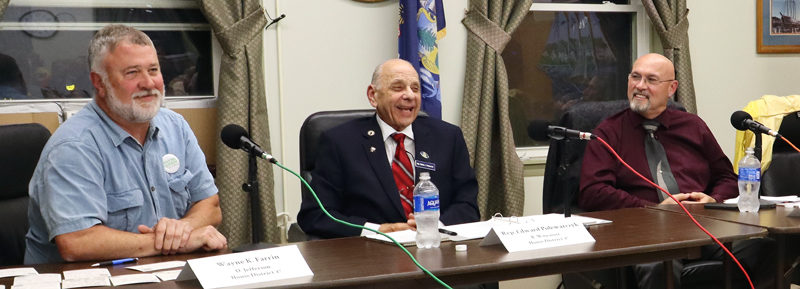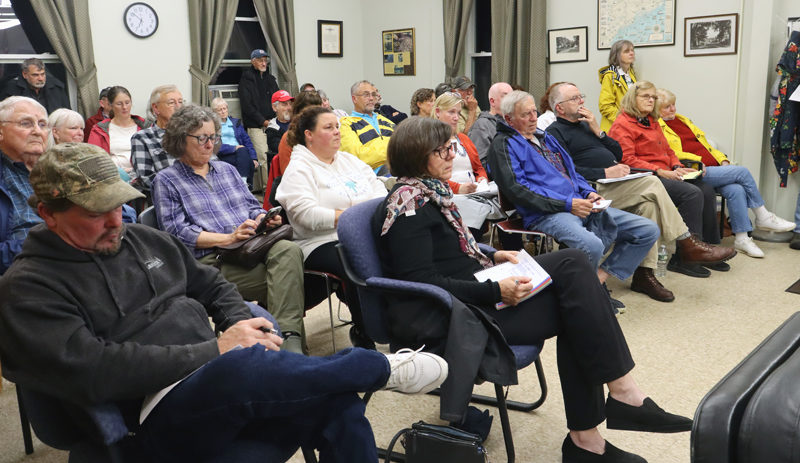
From left: House District 47 candidates Wayne Farrin, D-Jefferson, Rep. Edward “Ed” Polewarczyk, R-Wiscasset, and House District 49 candidate Vincent Brown, R-West Bath smile as audience members applaud at the end of a candidate forum at the Wiscasset municipal building the evening of Thursday, Sept. 26. (Piper Pavelich photo)
Five candidates for state office discussed issues plaguing Mainers ranging from rising property taxes to increased housing needs during the first of five forums co-hosted by The Lincoln County News and Boothbay Register on Thursday, Sept. 26.
The forum, which was held in the Wiscasset municipal building meeting room, was attended by nearly 50 community members and included candidates for House Districts 47, 49, and 53.
State Rep. Edward “Ed” Polewarczyk, R-Wiscasset, and Wayne Farrin, D-Jefferson, are the candidates for House District 47, which consists of Alna, Jefferson, Whitefield, and Wiscasset.
State Rep. Allison Hepler, D-Woolwich, and Vincent Brown, R-West Bath, are the candidates for House District 49, which consists of Arrowsic, Georgetown, Phippsburg, West Bath, and Woolwich.
State Rep. Michael Lemelin, R-Chelsea, and Judith “Judy” Tunkle, D-Dresden, are the candidates for House District 53, which consists of Chelsea, Dresden, Pittston, and Randolph. Due to scheduling conflicts, Lemelin attended the Sept. 26 forum while Tunkle attended the forum held on Monday, Sept. 30 at Pownalborough Hall in Dresden.
Lincoln County News Editor Maia Zewert moderated the Sept. 26 forum, posing questions to the candidates over the course of 90 minutes.
After introductions, each candidate shared the most common issues constituents have mentioned to them, which included affordable housing and rising taxes.
Farrin, who has been a licensed real estate agent since 1988, said L.D. 2003 – a bill that allows the development of additional accessory dwelling units on properties – is a “good start” to addressing the state’s housing needs, but that more should be done. He suggested revitalizing the development of cape-style modular homes, a type of home that was popular among young homeowners in the area due to the ability to easily expand upon it, he said.
“It would have a one-bedroom, bathroom, living room, kitchen, some place to live for a young person to get, and then they would expand into another bedroom or two as they had kids or the family got bigger, and they were able to buy it,” Farrin said. “Then the banks, the mortgage company, started stopping the loans for these things because they weren’t finished.”
Polewarczyk said the term “affordable housing” is an “oxymoron” due to the state of taxes, wages, and building costs in Maine. Existing housing options are becoming unaffordable because rental costs are rising while renter’s wages are declining, which he attributed to increases in taxes.
“If I talked to a builder, and he tells me that it’s somewhere between $300 and $375 a square foot, that makes a small house … $300,000 or greater. I don’t know how you call that affordable,” he said. “… It’s a crisis. Not an easy problem to solve, not sure what the legislation should be to solve it.”
Brown said he would like to see the deregulation of trade certifications so that people with universal work experiences can obtain licensing to work in construction, and at a faster rate.
“There’s a huge lack of vocational talent … In all the trades, not just construction. This would ease the burden,” he said.
Lemelin said that helping Mainers get off of welfare and into the workforce will contribute to the housing crisis and to lowering taxes.
“The housing situation is not something we’re going to solve any time soon. There will never be an actual affordable housing because what’s affordable to me is not affordable to the next person,” he said. “Get people off of welfare and get them to work. Even if we do this, it doesn’t mean we have affordable housing, it just means we have housing.”
Additionally, Lemelin said that the state has a surplus of funds each year and that it should be allocated to help with property taxes.
“We need to reallocate this money, stop getting it where it doesn’t belong, and help Mainers succeed and progress in life,” he said.
As a Woolwich Select Board member, Hepler said she “knows all too well” how property taxes are affecting residents.
“We work hard in our towns to keep the tax burden as low as we can,” she said. “We can’t control price of groceries, but what we can do in our towns and in the state is to make sure that property taxes are affordable … Also provide services that Maine people need.”
Hepler said the state’s homestead exemption – a program that provides property tax relief for certain individuals who have owned homestead property in Maine for at least 12 months – has been helpful for Mainers. The program provides a reduction of up to $25,000 in the value of a home for property tax purposes, according to maine.gov.
Candidates also discussed the state of emergency services in Maine, including a proposed emergency response rule from the Occupational Safety and Health Administration. According to Lincoln County fire department officials, the proposed regulations would increase financial burdens on emergency services by requiring the implementation of additional safety measures, which could possibly result in reduced manpower and limited resources.
Brown said because OSHA is a federal entity, applying pressure is the only thing that can be done at the state level.
“We can’t change their mind. We can influence their decisions and voice our disagreement with it, but, ultimately, the fed is going to make the decision,” he said.
Polewarczyk said the proposed rule is “another part of the federal government intervening in the way we live.” He noted that forcing community departments to comply with the proposed rule would be burdensome.
“Equipment, as an example, is limited by its use in service, not by how good it works or how good they’ve maintained it. (The rule) forces these small fire departments to replace equipment that is still very usable,” he said. “Additional training for individual firemen will range about $12,000 a piece. Most fire departments in our rural communities can’t afford that.”
The Legislature was able to send a letter to Maine’s congressional delegates, according to Polewarczyk, and OSHA’s comment period on the new regulations was extended shortly after. He encouraged audience members to attend OSHA’s informal public hearing on the matter on Tuesday, Nov. 12. Remote access will be available.
Hepler said that while health care is not her “forte,” she believes the state needs to do more to make sure it is affordable for Mainers.
“We’re making progress. There’s no interest on medical debt … MaineCare has expanded to include dental care, and school-based oral health is up, I would like to do more about that. I would also like to see more reduced drug prices.”
Lemelin said because of his role on the 131st Legislature’s Joint Standing Committee on Health and Human Services, he could talk to audience members “for an hour and a half” about health care and the issues Mainers are facing that he would like to see addressed, including drug use and mental health services.
“The problem here in Maine is that we don’t try to solve the drug issues. What we do here in Maine is pass laws to make sure that the drug addicts don’t die,” he said. “We pass laws so that they can get unlimited needles so that they don’t get hepatitis … We don’t solve the issue, and this is a major, major problem.”
Lemelin said one of the main reasons the state has a “drug problem” is due to the mental health of drug users. Additional psychiatrists, counseling centers, and treatment centers are needed to provide adequate mental health services to Mainers, according to Lemelin.
“We don’t have the facilities, we don’t have the beds, and we need to change this,” he said.
Incumbents running for reelection shared their proudest achievements from the most recent term they served.
Hepler said the thing she is most proud of is her role in “overhauling the bottle redemption program,” or L.D. 1909, “An Act to Modernize Maine’s Beverage Container Redemption Law,” which passed in 2023.
“You won’t see much difference, but (redemption centers) have received more money from the distributors for a handling fee that allows them to pay increased rents and increased labor costs,” she said.
Lemelin said he is most proud of the bills he has brought forward, including L.D. 1375, “An Act to Provide Funding for a Chapel at the Maine Veterans’ Memorial Cemetery in Augusta,” which was enacted in 2023, and L.D. 826, “An Act to Provide for the Management of the Waste Components of a Solar Energy Development upon Decommissioning,” which was enacted in 2023.

Audience members fill the seats at a candidate forum co-hosted by The Lincoln County News and Boothbay Register in the Wiscasset municipal building the evening of Thursday, Sept. 26. Candidates for House District 47, House District 49, and House District 53 discussed topics such as affordable housing, rising energy costs, and health care during the 90-minute forum. (Piper Pavelich photo)
Polewarczyk said the bills he has worked on are his proudest accomplishments, including L.D. 2027, “An Act to Clarify the Property Tax Exemption for Air Pollution Control Facilities,” which was sponsored by Sen. Cameron Reny, D-Bristol, and cosponsored by Hepler and Polewarczyk. It was brought before the Legislature in an emergency session; therefore, it needed a two-thirds majority vote to pass. It was enacted in April.
Brown said if he is elected, his priority is to utilize government spending to ease the tax burden for Mainers. He said he would suggest spending money on programs that would bolster the economy while preserving Maine’s ecological beauty.
“The tax burden is ridiculous, and the reason is because there’s not a lot of transparency,” he said. “They’re spending money to fix a problem that’s not the cause of a situation.”
If he were elected, Farrin said his focus would be on increasing opportunities to develop affordable housing.
“I think I’ve been involved in it for so long that I think I can be a good part of it,” he said.
Each candidate delivered a concluding statement at the end of the forum, thanking audience members for attending and reiterating their desire to serve and help Mainers.
The series of forums continued at 6 p.m. on Monday, Sept. 30, at Pownalborough Hall in Dresden. Candidates for Senate District 24, which includes Dresden and all of Sagadahoc County, and House District 53, which includes Chelsea, Dresden, Pittston, and Randolph, were on the panel.
The third forum is at 6 p.m. on Thursday, Oct. 3, at the Charles E. Sherman Jr. American Legion Post 36 in Boothbay. The forum will include candidates for Senate District 13, which includes all of Lincoln County except Dresden, as well as Washington and Windsor, and House District 48, which consists of Boothbay, Boothbay Harbor, Edgecomb, South Bristol, Southport, and Westport Island.
The fourth forum is at 6 p.m. on Monday, Oct. 7, at the Waldoboro municipal building. Panelists include candidates for House District 45, which consists of Bremen, Louds Island, Waldoboro, Friendship, and Washington, and House District 62, which includes Hibberts Gore and Somerville, as well as China, Palermo, and Windsor.
The final forum is at 6 p.m. on Thursday, Oct. 10, in the Great Salt Bay Community School cafeteria in Damariscotta. Candidates for Senate District 13 and House District 46, which consists of Bristol, Damariscotta, Monhegan, Newcastle, and Nobleboro, will participate.
Each forum is livestreamed on The Lincoln County News Facebook page.
For more information or to suggest a topic of conversation for candidates to discuss at a future forum, email editor@lcnme.com.
The general election is Tuesday, Nov. 5.






